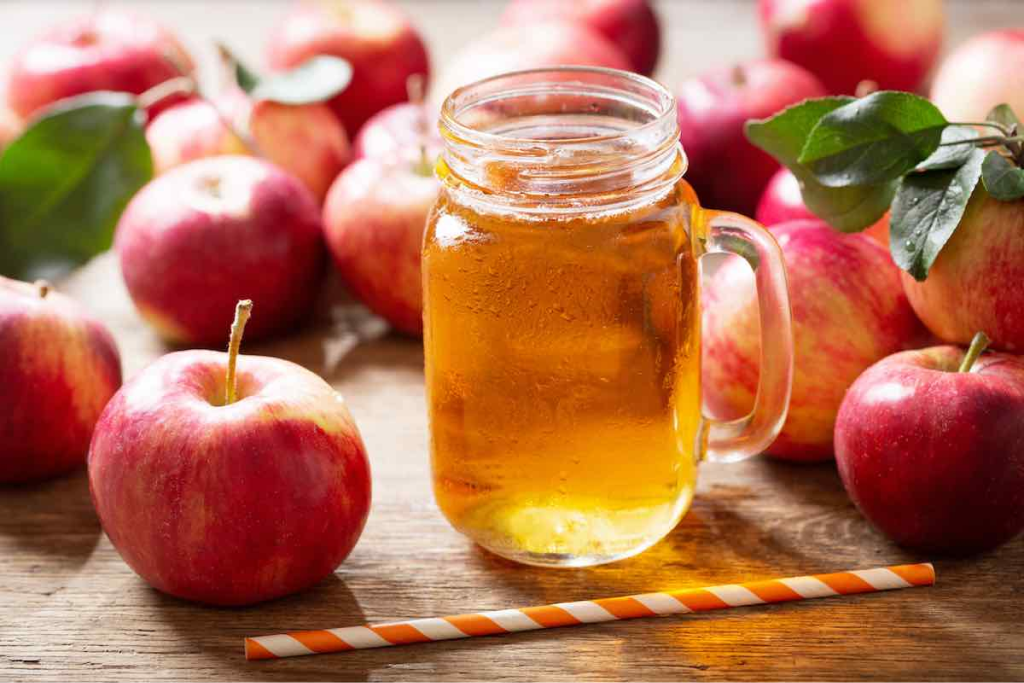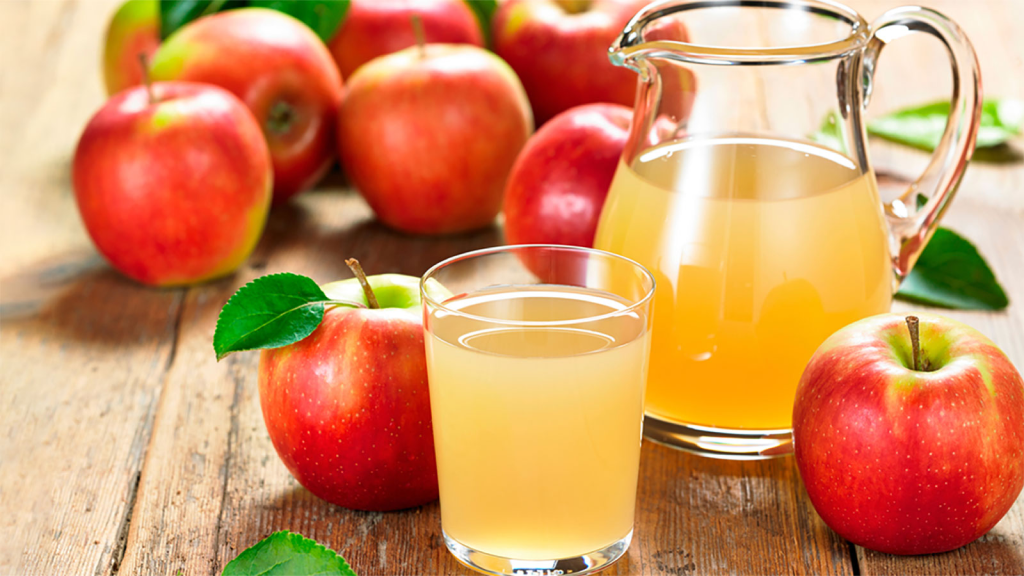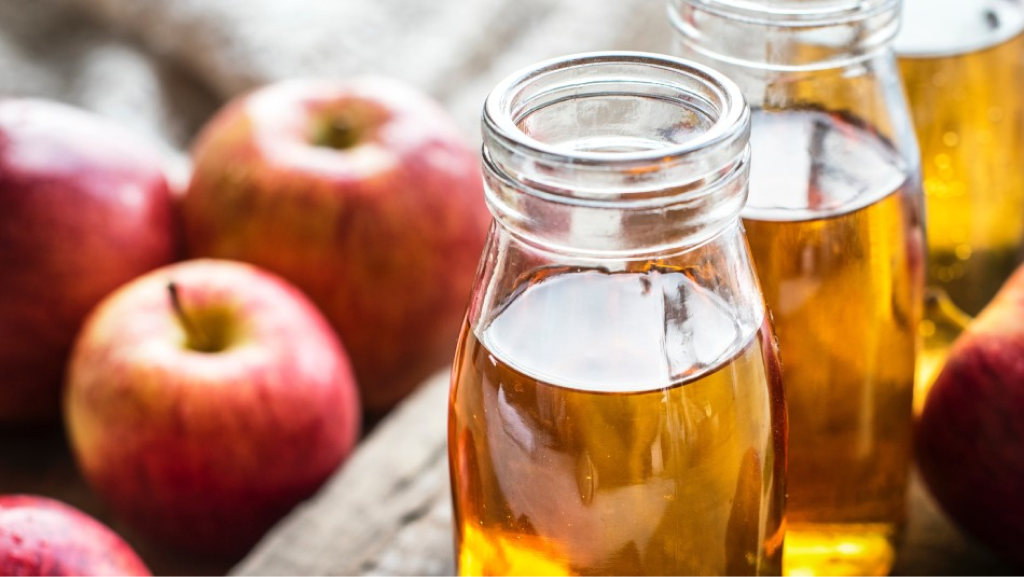The apple tree’s fruit is used to make the well-known beverage Busch Apple (apple juice). While whole apples have many health benefits, apple juice has several benefits that make it a perfect supplement to a balanced diet. This post will discuss the prominent health advantages of apple juice (Bursch Apple) and why it’s a fantastic option for anybody trying to become healthier. We will also compare the nutritional benefits of apple juice with those of whole apples.
What Is Apple juice?
One cup of apple juice is made from two medium-sized apples after they have been pressed. The strong demand for apple juice has led to its enormous growth. Following pressing, apples undergo further filtering or pasteurization to eliminate any remaining particles contributing to the final extract’s thinner consistency. It’s important to note that the nutritional content of store-bought apple juice may differ from that of freshly squeezed juice due to the pasteurization process.
Apple Juice (Busch Apple) Nutrition Facts
Apple juice is an excellent source of essential minerals, vitamins, and antioxidants that promote many different aspects of health. In only one cup, apple juice contains:
- 110 kcal
- 28 grams of carbs, or 9% of the recommended daily intake
- Thirty percent of the recommended value, or 78 mg, of vitamin C
- Potassium in 300 mg (9% of the daily value)
- One percent of the recommended value, or 36 mg, of sodium
Apple juice also has trace copper, iron, calcium, and vitamin B levels. The precise nutritional value may change based on the kind of apples and how they are juiced.
The Health Advantages of Apple Juice (Busch Apple)
Advantages of Cardiovascular Health

The potential advantages of apple juice for cardiovascular health have been extensively researched. Apple juice’s antioxidants and polyphenols may help decrease LDL (harmful) cholesterol levels and lessen the risk of heart disease.
According to UC Davis School of Medicine research, consuming apple juice helps decrease LDL cholesterol levels, which in turn lowers the risk of heart disease. Other research shows that women who drank apple juice had blood antioxidant activity that was 11% higher, which is crucial for preventing heart disease and other cardiovascular issues.
Cognitive Ability and Brain Health
Additionally, apple juice may improve cognitive performance and brain health, especially as we age. Its antioxidants and polyphenols may shield the brain from harm caused by free radicals and promote normal brain function.
A daily dose of apple juice, or two or three cups for humans, was found in a series of studies on mice to enhance memory function, preserve brain levels of acetylcholine, a neurotransmitter crucial to memory, and inhibit the build-up of beta-amyloid protein fragments linked to Alzheimer’s disease-related brain damage. These results imply that apple juice may enhance cognitive health and have neuroprotective benefits, but additional study is necessary.
Support for the Immune System

Apple juice is an excellent source of vitamin C, which is essential for immune system support. Vitamin C is an important component of the body’s defense against infections and diseases. It aids in the stimulation of the formation of white blood cells and antibodies.
You may strengthen your body’s natural defenses and perhaps lower your chance of illness by frequently ingesting apple juice. Apple juice may boost immune function, but it’s crucial to remember that it shouldn’t be used as a stand-alone therapy for any disease or ailment.
Digestive Health
Apple juice could also be advantageous for the digestive system. Apples contain malic acid, which may improve liver function and assist with digestion. Furthermore, the combination of apple juice’s stimulating nutrients and fiber may help ease the symptoms of diarrhea, cramping, bloating, and constipation.
Apple juice’s sorbitol concentration may facilitate more effortless stool movement and smoothing of the digestive system. But, it’s crucial to drink apple juice in moderation since, for some people, consuming too much of it might cause digestive problems like diarrhea.
Skin Conditions

Apple juice is an excellent source of vitamin C, which is crucial for healthy skin. It supports healthy cell growth and function, including skin regeneration and repair, and aids in the normal clotting of blood and the healing of wounds. You may enhance the look and health of your skin by drinking apple juice on a regular basis.
How May Apple Juice Be Included Into a Diet?
There are numerous convenient ways to incorporate apple juice into your daily diet, giving you the power to make healthy choices that suit your lifestyle.
- Have some apple juice.
- Juice the apple with the yogurt.
- Additionally, you might add apple juice to the soup.
- Savor delicious waffles or pancakes with apple juice.
- When making homemade popsicles, use apple juice.
Apple juice can also be used to create flavorful sauces for your favorite meats, inspiring you to get creative in the kitchen.
Include your smoothies there.
In homemade popsicles, add apple.
What negative impacts does apple juice have?

While apple juice can be a healthy addition to your diet, it’s important to be aware of potential issues that can arise from overconsumption, keeping you informed and in control of your health.
- It may cause a person to gain weight.
- Kidney stones are more likely to occur when oxalates are present in apple juice.
- Apple juice contains more sugar and less fiber than raw apples, while raw apples are rich in fiber. As a consequence, blood sugar levels may rise.
- Consuming too much apple juice might lead to some digestive issues.
Possible Consequences and Things to Think About
Even though apple juice has many health advantages, there are a few things to keep in mind and some negatives.
Sugar Content
Apple juice has a high natural sugar content, which, if consumed excessively, may lead to weight gain and other health problems. Eating apple juice in moderation is essential in a balanced diet.
Absence of Fiber
Apple juice does not include the fiber present in the peel and meat of the fruit, unlike entire apples. In addition to being beneficial for digestive health, fiber may make you feel full. In addition to a diet high in fiber, you should consider eating whole apples or drinking apple juice to enhance your fiber intake.
Possibility of Dental Decay

If oral hygiene is not maintained, the sugar in apple juice may lead to tooth decay. To keep your teeth healthy, wash your teeth as often as possible and consume apple juice in moderation.
Reactions Caused by Allergies
A few individuals may have an allergy to apples or apple juice. If you encounter any negative side effects after drinking apple juice, stop using it and seek medical advice.
Medication Interactions
Antibiotics and statins are two examples of the drugs that may interact with apple juice. Before adding apple juice to your diet, check with your doctor if you are on any medicines.
Conclusion
Apple juice is a tasty, wholesome beverage with many health advantages. Apple juice may benefit a balanced diet by enhancing brain health, immune system function, cardiovascular health, and immune system support. But it’s crucial to use apple juice sparingly and to be mindful of any possible risks or issues.
Choose apple juice that has yet to go through much processing and doesn’t have any added sugar or preservatives. Clear apple juice is often seen as inferior to cloudy apple juice, which includes less pulp and preserves less of the fruit’s nutritional chemicals.
Recall that even while apple juice has some health benefits, it shouldn’t take the place of a diversified, nutrient-rich diet and consistent exercise. If you have any questions or concerns about introducing apple juice into your lifestyle, speak with a healthcare expert.



